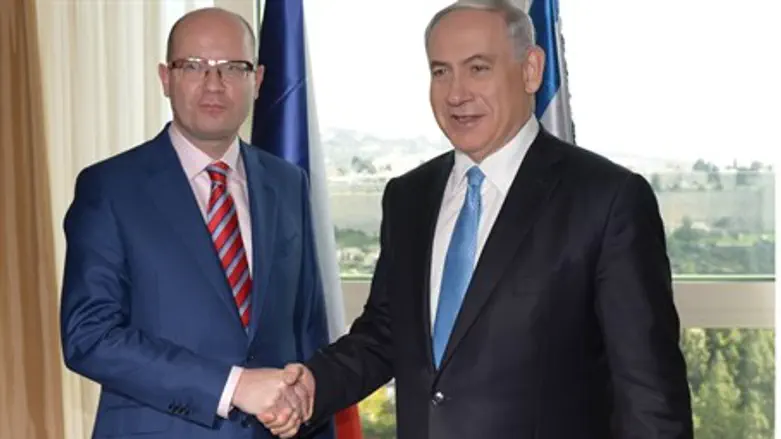
Prime Minister Binyamin Netanyahu shot back at critics of the "Jewish State Law" during a meeting with his Czech counterpart Bohuslav Sobotka, during a high-level visit to promote ties between Israel and the Czech Republic.
Recognition of Israel as the nation-state of the Jewish people is a basic requirement of any peace deal as far as Israel is concerned, Netanyahu reminded the bill's detractors.
"Israel is the nation-state of the Jewish nation. Israel is a model democratic state - that's how it (always) was and that's how it will be," the PM said. "A state which enshrines equal personal rights for each and every one of its citizens."
"I don't know of a more vibrant democracy that Israel in the world - certainly not in our region" he continued. "This democracy is guaranteed. What is being challenged is Israel as the nation-state of the Jewish people, and therefore we are updating via the law this national right of the Jewish people, side-by-side with a guarantee of the personal rights of all of its citizens."
Netanyahu repeated his pledge to push the law through, whilst making sure it enshrines those two core values of Israel as a Jewish and democratic state. "We will continue to do this in order to clarify the fact that Israel is (both) a Jewish and democratic state," he said.
On Monday, the US State Department issued a statement implying that the law would undermine Israel's dedication to equal rights.
"Israel is a Jewish and democratic state and all its citizens should enjoy equal rights," spokesman Jeff Rathke stated Monday. "We expect Israel to stick to its democratic principles."
In response, Economics Minister Naftali Bennett (Jewish Home) declared that the US had no business getting involved in the bill.
"I say to the Americans that the affairs of the State of Israel - we will manage [ourselves]," Bennett stated, speaking on IDF Radio's "Good Morning Israel" show Tuesday morning. "We have to deal with the implications of [the law and] what kind of country we want."
"At the end it is our problem," he added. "This is an internal issue and I think that no one has the right to intervene with it."
The bill is an amalgamation of two separate proposals - one by MK Ze'ev Elkin (Likud), and a nearly identical version by MKs Ayelet Shaked (Jewish Home), Yariv Levin (Likud) and Robert Ilatov (Yisrael Beytenu). It passed a crucial cabinet vote on Sunday, which cleared the way for it to be put to a vote in the Knesset.
As it stands, the bill outlines that "The state of Israel is the national home of the Jewish people in which it realizes its aspiration for self determination in accordance with its cultural and historic heritage... The right to realization of national self determination in Israel is exclusive to the Jewish people."
The prime minister has promised to amend these last passages, however, to make the law more “moderate.” In his version, Israel's character as the Jewish national state, and its democratic nature, receive equal stress. In the current version, Israel's Jewish character is placed before its democratic nature. However, the current version also states clearly that Israel is a democracy and that it respects the rights of all its citizens.
Among the practical implications of such an amendment is the status of Arabic, which under the original version would be relegated from one of two official languages of the State of Israel (along with Hebrew) to one with "special status." Netanyahu's amendment would maintain its status as an official language.